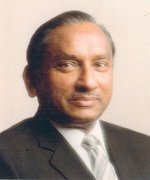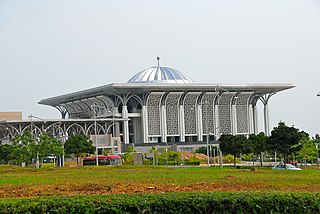Related Research Articles

Tun Hussein bin Dato' Onn was a Malaysian politician who served as the third prime minister of Malaysia from the death of his predecessor Abdul Razak Hussein in January 1976 to his retirement in July 1981. Moreover, he was the Member of Parliament (MP) for Sri Gading from 1974 to 1981, representing Barisan Nasional (BN) and United Malays National Organisation (UMNO). He was granted the soubriquet Father of Unity.
Professor Emeritus Datuk Dr Shad Saleem Faruqi is a Malaysian legal scholar and professor of law at the University of Malaya, currently holding the Tunku Abdul Rahman Chair as Professor of Constitutional Law. He is also the fourth holder of the Tun Hussein Onn Chair in International Studies at the Institute of Strategic and International Studies (ISIS) Malaysia effective July 2019 to June 2021. He has served Universiti Teknologi MARA in Shah Alam, Selangor in various capacities from 1971 onwards. He served as the Head of the Diploma in Law programme (1979–1984), as Assistant Rector (1996–1999), Assistant Vice-Chancellor (1999–2001) and Legal Advisor.

This article lists important figures and events in Malaysian public affairs during the year 2002, together with births and deaths of notable Malaysians.
Ahmad Ibrahim Kulliyyah of Laws (AIKOL) is the law faculty of International Islamic University Malaysia. Previously known as the Kulliyyah of Laws, it was renamed in 2000 in honour of its founding father and ex-Dean, professor Ahmad Mohamed Ibrahim. Being the first Kulliyyah (faculty) to be formed together with the university, it is now one of the largest law schools in Malaysia and has produced thousands of law graduates since 1983: legal practitioners, shariah lawyers, academicians, legal advisors, deputy public prosecutors, judiciary members, ministers and politicians. The current Dean is Professor Dr. Farid Sufian bin Shuaib.
Tun Ahmad Fairuz bin Sheikh Abdul Halim is a retired Malaysian lawyer who served as the fourth Chief Justice of Malaysia. A controversial figure, he held that position from 2003 to 2006. In August 2006, he courted controversy by suggesting the abolishment of English Common Law to be replaced by Islamic Syariah Law. In September 2007, he was implicated in a 'judicial fixing' scandal. He retired in November 2006 and was replaced on 2 November 2006 by Abdul Hamid Mohamad as the Chief Justice.
Tun Mohamed Suffian bin Mohamed Hashim was a Malaysian judge, eventually serving as Lord President of the Federal Court from 1974 to 1982. He had previously served as Chief Justice of Malaya.
Ong Hock Thye (1908–1977), PMN, PSM, DPMS, also known as H. T. Ong, was Chief Judge of Malaya and a Barrister-at-Law of Middle Temple. He was the son of Mr. Ong Teng Up and was born in Penang in 1908. In 1935, he married Chong Khew Yin (1915–1942). In 1943, he married Mary Chung Yuet See (1924–1995), the eldest daughter of Kapitan China Chung Thye Phin.
The Royal Commission of Inquiry into the V.K. Lingam Video Clip was formed in late 2007 to investigate into an allegation of illegal intervention into the judicial appointment process of Malaysian judges purportedly occurred in 2002. The formation of the commission was a follow-up to a recommendation by a three-man panel which was tasked to determine the authenticity of a video clip of a telephone conversation that raised the allegation.

Thirugnana Sampanthar Sinnathuray, known professionally as T. S. Sinnathuray and to his friends as Sam Sinnathuray, was a judge of the High Court of Singapore. Educated at University College London and called to the bar at Lincoln's Inn, he practised for a few years in a law firm before beginning a career with the Singapore Legal Service, serving with the Attorney-General's Chambers as Crown Counsel and deputy public prosecutor (1960–1963), and senior state counsel (1966–1967); with the Subordinate Courts as a magistrate (1956–1959), first district judge (1967–1970), and senior district judge (1971–1978); and with the Supreme Court as deputy registrar and sheriff (1959–1960), and registrar (1963–1966). In 1978 he was elevated to the office of Judge of the High Court of Singapore, and served until his retirement in 1997.
Dato' Mohd Zaid bin Ibrahim is a Malaysian politician, lawyer and former Minister in the Prime Minister's Department for Legal Affairs and Judicial Reform. He was previously a Senator in the Dewan Negara, the upper chamber of the Parliament of Malaysia.
Tan Sri Datuk Michael Chang Min Tat was a Malaysian Federal Court judge, a Commissioner of Law Revision and Law Reform and chairman of the Penang State Planning Appeals Board, among other roles, and was acknowledged for his tremendous contributions to the development of the law in Malaysia.
UiTM Faculty of Law is one of the professional graduate faculties of UiTM and is located in Shah Alam, Malaysia. It is among the notable public premier law school in Malaysia.

This article lists important figures and events in Malaysian public affairs during the year 2010, together with the deaths of notable Malaysians. Malaysia Day, 16 September was celebrated as a national holiday for the first time.

2011 in Malaysia is the 54th anniversary of Malaysia's independence.
Datuk Murugesan Sinandavar is a social activist in the state of Selangor. He is an Advocate & Solicitor, High Court of Malaya by profession and has his own firm Messrs. MurugesanSinnandavar & Associates in Klang, Selangor.

Douglas Samuel Jones, is an independent international arbitrator based in London, Sydney and Toronto. He is a door tenant at Atkin Chambers, London, a member of Sydney Arbitration Chambers, and a member of Toronto Arbitration Chambers in Toronto, Canada. He serves as an International Judge of the Singapore International Commercial Court.
Tun Mohamed Raus bin Sharif is a retired Malaysian lawyer who served as the eighth Chief Justice of Malaysia from 1 April 2017 until 31 July 2018. He replaced Arifin Zakaria.
Tan Sri Datin Paduka Zaharah binti Ibrahim was the eleventh Chief Judge of Malaya. She also served as chairperson of Prasarana Malaysia Berhad.
References
- ↑ "Cabinet nod for panel's terms of reference". New Straits Times. 29 November 2007. Archived from the original on 2 January 2008.
- ↑ Malaysian Bar, Praxis: Chronicle of the Malaysian Bar Apr–Jun 2014 (2014). Citation for Mahadev Shankar, recipient of the Malaysian Bar Lifetime Achievement Award 2014. Lexis Nexis. p. 4.